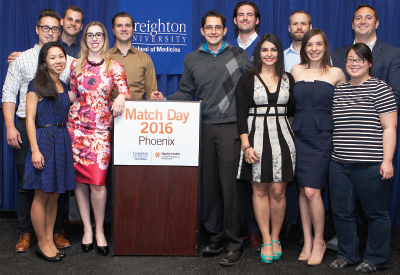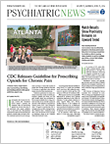A creative third-year psychiatry clerkship in psychosomatic medicine is offering medical students at the Phoenix Regional Campus of Creighton University Medical School a unique exposure to psychiatry in a medical setting.
Now in its fourth year, the program appears to be paying off: this year 10 of the campus’s 42 graduates matched into psychiatry—just under 25 percent and well above the national average.
“The traditional third-year clerkship in psychiatry revolves around inpatient psychiatry that’s typically very separate from the rest of medicine, usually in a separate building,” said Jason Caplan, M.D., chair of psychiatry at Creighton University School of Medicine, St. Joseph’s Hospital and Medical Center, Phoenix. “Our clerkship revolves around a psychosomatic consult service that brings our students into contact with a range of general medical practitioners and specialists and a variety of patients. It allows us to attract students with a broader range of interests in medicine than the narrower focus of an inpatient unit. The students are voting with their feet on Match Day by choosing to enter a specialty that is traditionally extremely underserved.”
Caplan was hired at St. Joseph’s in 2008 to grow a clinical service around which an educational program could be based. He decided that a psychosomatic medicine service would be a natural fit for the existing resources at St. Joseph’s, a large, 607-bed tertiary and quaternary care hospital without an inpatient psychiatry unit.
The service has since grown to include a number of faculty practicing general psychosomatic medicine along with subspecialty care in transplant psychiatry, brain injury, and emergency psychiatry.
The Phoenix Regional Campus of Creighton University School of Medicine officially opened at St. Joseph’s Hospital and Medical Center in July 2012. All third-year students now have their primary exposure to psychiatry on the consult service, while additional experiences (including transplant psychiatry, pain and palliative care, and child psychiatry at Phoenix Children’s Hospital) also focus on the practice of psychiatry in the medical setting.
There was some initial concern that students would be deprived of the intense immersion in psychiatry that comes with a traditional inpatient rotation. But Caplan said students’ performance on the NBME shelf examination (the clinical clerkship exams taken by students following a rotation) has been well above the national average.
“So far we have a 100 percent pass rate, our average score falls at the 68th percentile nationally, and 36 percent of our students have scored at the 80th percentile or higher,” he said.
Students have matched at a variety of well-respected programs including Harvard Longwood; Northwestern; Vanderbilt; Mayo Clinic; University of California, San Diego; University of California, Davis; and Stanford.
Also noteworthy is the fact that Caplan himself has been one of the three nominees for the third-year Golden Apple teaching award each year the campus has been open, winning the inaugural award in 2013.
Is this kind of program generalizable to other medical schools?
“Absolutely,” Caplan said. “One thing every medical school has in common is a general hospital. The design of a third-year clerkship focused on the practice of psychosomatic medicine is generalizable to any medical school with a psychiatric consult service of sufficient size to accommodate the medical students. For the growing number of new medical schools and satellite campuses such as ours, this design makes excellent use of resources that are typically already available without requiring psychiatry-specific venues.” ■

